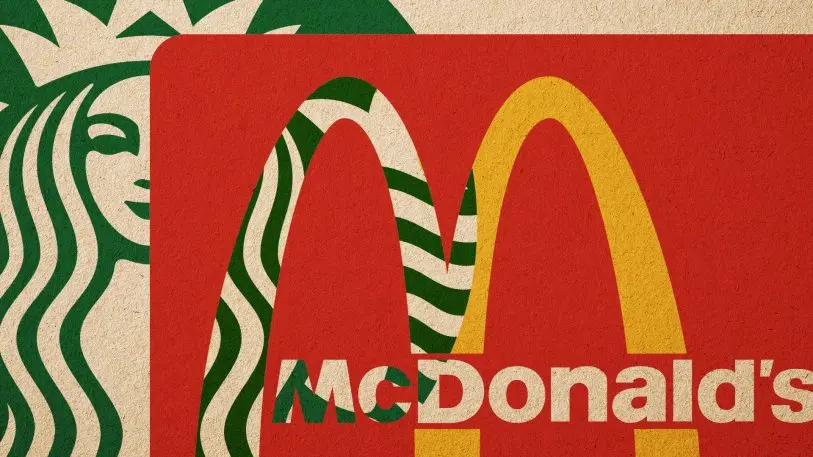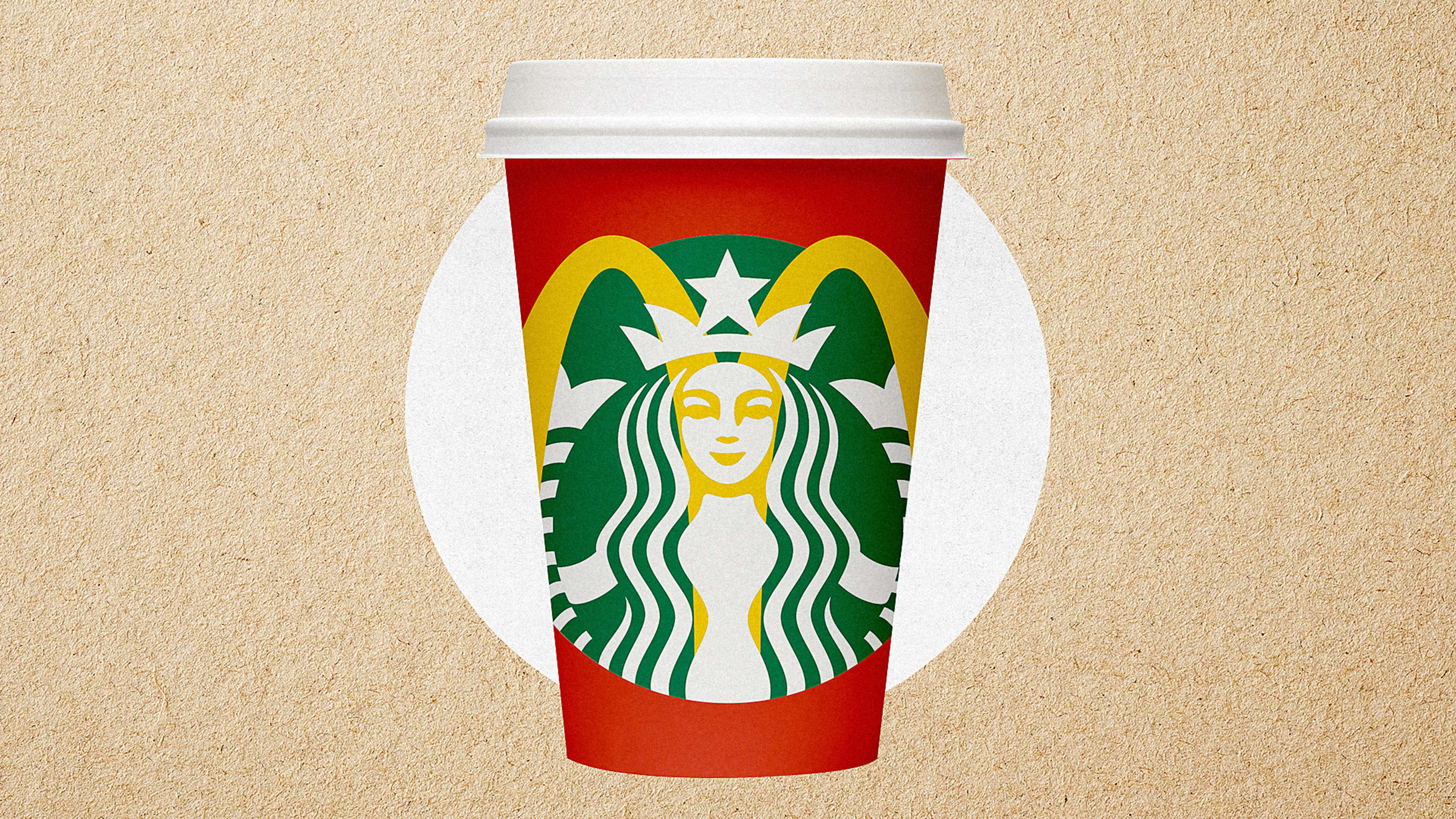In the world of quick coffee, Starbucks and McDonald’s are as fierce as competitors come. They’re multibillion-dollar global giants, fighting for our caffeinated hearts through drizzles and discounts.
But when it comes to the cup that coffee comes in, they’re now on the same team. McDonald’s and Starbucks are joining forces to build a fully recyclable, compostable cup of the future within the next three years–one that may include not just the cup itself, but a lid and straw to go along with it.
The news comes on the heels of a food industry charge to reduce plastic in packaging, and straws in particular, by Chipotle, Subway, and Burger King, too. Starbucks itself just announced a new lid to replace straws in many drinks as part of a 2020 initiative to ban straws altogether. Together, McDonald’s and Starbucks distribute a combined 4% of the world’s 600 billion cups annually, and represent two of the top three most popular food chains worldwide. Each company’s cups are technically recyclable, but, for all sorts of practical matters related to recycling infrastructure, they rarely are.
McDonald’s and Starbucks plan to leverage their combined scale to change the way all single-use cups are made and disposed of. It’s a plan of unprecedented scale in the fast-food industry to improve its ecological footprint. “We’ve been at this for a while [alone], but we were getting tired of incrementality,” says Colleen Chapman, vice president of Starbucks’s global social impact overseeing sustainability.
The initiative is called the NextGen Cup Challenge, and it invites entrepreneurs, large and small, to develop materials and designs that can replace today’s cups. The challenge will provide grants to good ideas, and help startups work together to combine them into market-ready solutions. It was launched by Starbucks earlier this year with the earth-friendly innovation and investment firm Closed Loop Partners. Now, McDonald’s is joining the initiative.

Unlikely allies
For all the global good at stake, it may seem strange that two mega competitors are teaming up to codevelop and co-fund a better cup, rather than keeping that sort of innovation proprietary. McDonald’s says that most chains are making cups out of the same fibers and plastics already. Packaging may provide a competitive advantage, but the materials within the packaging do not. And McDonald’s even insists that the potential financial savings won’t be that significant in the best of circumstances, because the materials aren’t being optimized for cost, but for impact.
“We’re looking at this as a pre-competitive opportunity. Before we would even compete in the normal way we traditionally would compete, this is kind of a step further back in the chain, saying, ‘how can we work together to solve a problem that’s an issue for society, for the environment,” says Marion Gross, the McDonald’s chief supply chain officer for the United States. “There are certain things we’d say that we’re not competitors on. The easiest example would be food safety. In food safety, there’s no competitive advantage. We all have to come with solutions and make sure we’re watching out for the public’s interest. This is something that we see as kind of similar. It’s a societal issue, and there’s a way that we can come together, not as competitors, but as problem solvers. We can use our collective scale to make a difference.”
In reality, while Starbucks and McDonald’s compete for sales on a daily basis, they’ve been conversing about the environment for years. The burger company had actually been talking to Starbucks for years about the possibility of collaborating on various sustainability initiatives, and the opportunity finally cemented itself around the NextGen initiative.
“When they made their announcement, we thought this would be a great way for us to join something that would have a positive impact, and do it in a really big way,” says Gross. “Two big organizations coming together–and hopefully many more will join. We would love to see that, because we think that together we can all make a difference here.”
The challenge formally launches this September, and awardees will enter a six-month accelerator program and receive up to $1 million in funding. OpenIdeo will run the competition, while the accelerator companies will work closely with teams within McDonald’s and Starbucks to develop cup technologies that can handle the rigors of real-world use and scale.
[Source Image: SiberianArt/iStock]
The dirty truth of recycling
The dirty truth of the matter is that just because a cup is recyclable doesn’t mean it gets recycled. The plastic McDonald’s cups used for McCafé Frappés and polyethylene-coated paper cups used for its soft drinks, as well as the paper and plastic cups synonymous with Starbucks coffees and Frappuccinos, are all technically recyclable. Even still, Bridget Croke, vice president of external affairs at Closed Loop Partners, estimates that the real-world recycling of these cups is “nominal”–a claim that Gross openly confirms.
The problems are many. But mostly, the problem is that what we’ve labeled “recyclable” cups have to be redesigned to be truly recyclable in the real world.
Recycling is a far from universal system. In some places, it’s run by the city; in others, it’s run by private, for-profit companies. That doesn’t just mean one city will recycle a plastic bottle with a little 3 on the bottom, and another a 4. It means that some are capable, or willing, to sort out and repurpose various materials–like those polyethylene-coated paper soda cups–and others are not. There are countless other tiny catches within these systems, too. Straws, for instance, are so light that they can’t be sorted on a recycling production line, so they just get tossed into landfills. And most recycling facilities use automated sorting equipment that cannot identify black plastic, which has a trickle-down effect that’s putting TV plastics into our TV dinners.
“When I throw away a cup at Starbucks in Chicago, it may be getting recycled,” says Chapman. “But if you were in Des Moines, Iowa, and you put your Starbucks cup into a recycling bin at home, it may not be getting recycled.”
Closed Loop Partners comes in because the firm has a $100 million loan fund to improve local recycling facilities, and a strong understanding of designing solutions that can meet the real-world conditions of this infrastructural back-end. “Starbucks, what they do for a living is selling coffee and products–a great consumer experience–not fixing the recycling system. They need someone to be a filter who understands the whole system,” says Croke. “When we talked about the idea of a design challenge, we said, ‘Look, a design challenge is really important, and we need new designs.’ But we see designers come through our venture fund all the time. And if you’ve asked if any of them have ever been to a recycling facility to see if their design can be recycled properly, they haven’t.”
In other words, a more sustainable cup needs to be a more sustainable cup. But that definition is dependent on what suppliers can produce at scale, and what recyclers and composters can accept at scale. And in many cases, that’s going to require infrastructural upgrades alongside new materials.
Starbucks and McDonald’s plan to fight the scale of the problem with the scale of their own consumption. Thus far, Starbucks has contributed $5 million to the fund, and McDonald’s has now matched that. But the companies can dangle their much larger buying power as an incentive to any company that’s ready to innovate toward a better cup.
“If they’re the purchasers of solutions that come out of this [challenge], that shifts the market,” says Croke.
Recognize your brand’s excellence by applying to this year’s Brands That Matter Awards before the early-rate deadline, May 3.
